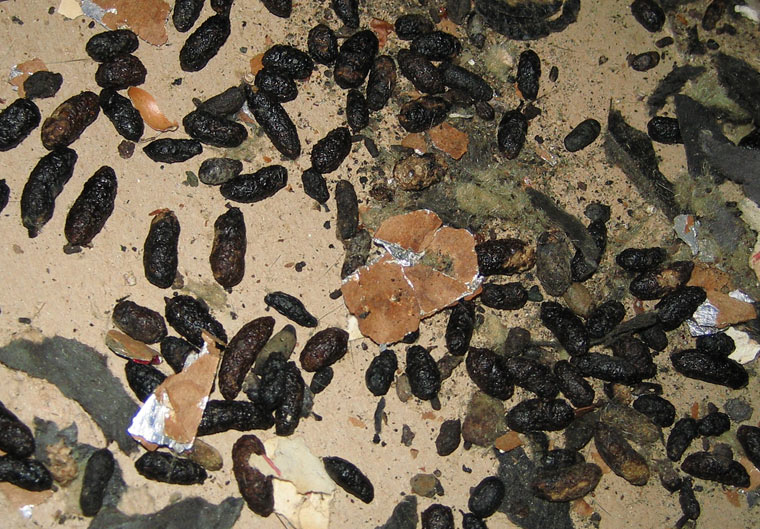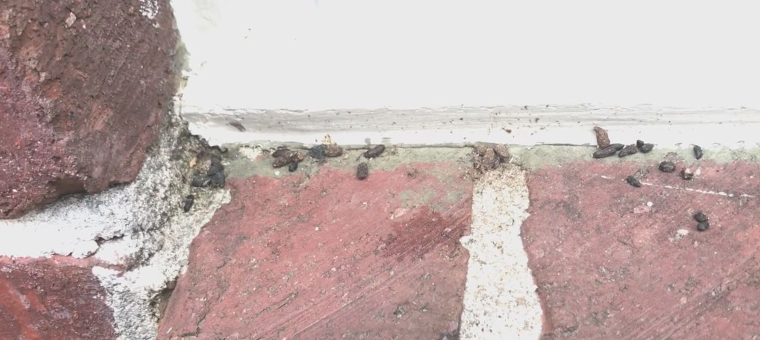-
info@aaanimalcontrol.com
Call us for help in your town
Humane Wildlife Education
What does squirrel feces look like and where can it be found?
Need squirrel removal in your hometown? We service over 500 USA locations! Click here to hire us in your town and check prices - updated for year 2020.
There are three quite serious diseases you will
need to take into consideration before you start
hunting out and moving around squirrel feces.
Tularemia is caused by a bacteria that seems to be
carried mostly by smaller animals — rodents, such
as mice and rats, as well as rabbits, and also
hares. The disease can be passed on to humans, not
just via the fees the urine, as we just mentioned,
but also by direct contact with an infected
animal, bites from infected deer fly and ticks,
and also drinking water that has become
contaminated with the bacteria. It is a disease
that can be treated with antibiotics, but in some
cases it can prove fatal.

Leptospirosis is another disease you’ll need to
concern yourself with, when handling squirrel
feces and urine. Another bacterial disease, it can
affect both animals (wild and domesticated) and
humans. The earliest of symptoms with this
bacterial infection are often similar to what
comes with bother, less dangerous and more common
conditions, making it easily missed by medical
professionals. If the disease is not diagnosed
correctly, it can't be treated, and then you enter
into dangerous territory. This is a disease that
will affect organs, such as the kidney and liver,
causing total failure in some cases. It can also
cause problems with the respiratory system, cause
meningitis, and the most severe of cases, can even
result in death.
Although wild animals, such as squirrels, can
carry the bacteria that causes leptospirosis,
other animals can too. Cattle, pigs, horses, and
other farmyard animals have all been known to
carry and transmit the infection, and rats and
mice, as well as domesticated or stray dogs.
The final disease you will need to think about
when dealing with squirrel feces, is typhus. Rats,
as well as other animals (including squirrels) can
carry fleas, and if these fleas are infected with
a bacteria called Rickettsia typhi, flea-borne
typhus, or endemic typhus, can spread, usually via
the feces left behind by infected fleas.
What Does Squirrel Feces Look Like?
If you spot small raisins, or something that looks
similar to a jelly bean, lying around, there’s a
good chance you will have found yourself some
squirrel poop. They’re about 5 to 8 mm in length,
and they’ll be liberally scattered around. These
creatures, just like others, such as rats and
mice, drop their waste matter as they run around,
so you will likely find squirrel droppings along
the routes the animal takes. You can use the trail
of feces to carefully diagnose the invading animal
(if you didn't already know it was a squirrel),
and also to find out where it is spending the
majority of its time. If there is no poop, there's
a good chance the squirrel is running around there
quite so much.
Cleaning After Squirrels - The Feces Problem
Need squirrel removal in your hometown? We service over 500 USA locations! Click here to hire us in your town and check prices- updated for year 2020.
Cleaning up after wild animal interlopers is never a pleasant experience, with a number of diseases to worry about. Squirrels are no exception to this rule, with a string of disease associated with the urine and feces of the animal. Tularemia, salmonellosis, and even leptospirosis — they all sound like made-up names, but they're real conditions that could affect not just you, but your household and farm animals too.

Squirrels defecate where they live, and if they've been living in your attic, your attic is also going to be where they defecate. This causes a number of problems, especially when it is left where it is. Mold can start to grow, caused by the moisture, and this can have a number of debilitating effects all by itself. As well as health concerns, mold and moisture in a building can cause structural problems, an unsightly mess, and even problems with electrical cables too.
Mold isn't the only thing you need to worry about, of course; the smell of animal waste will get worse the longer it is left, and the more there is of it, the more it will smell again. In turn, it might even attract other wild animals, and there is definitely more than a chance that you will get flies and maggots, especially if you have squirrel carcasses alongside squirrel waste.
Getting Rid of Squirrel Waste
The first thing that you'll need to do is physically remove the poop. This isn't a pleasant job and you'll want to protect yourself adequately. Eye and breathing protection is essential — goggles and breathing masks at the ready — but you will also want to wear a full suit if you can, and don't forget about the gloves.
The good news? Unlike the poop of other animals, squirrel feces doesn't tend to just fall apart and crumble when you touch it, making it slightly easier to clean up.
The bad news? You won't want to touch it, even with gloved hands. Everything that you use to touch the stuff will need to be either disposed of (such as in a fire or thrown away), or cleaned thoroughly, until you can be one hundred percent sure that no disease threats remain. You might want to buy a dustpan and brush just for this very occasion, and one that you don't mind getting rid of after you're done.
If squirrels have used your attic as a washroom, you will need to tear up and dispose of any attic insulation it has come into contact with, and then replace it.
There are two real methods of cleaning away the invisible bacteria that hangs around when the fecal matter itself has gone — good, old-fashion scrubbing with bleach and strong disinfectants, or using a fogging-based machine with an enzyme cleaner to ensure that quite literally every nook and cranny has been attended to. The latter is better, although the bleach and elbow-grease option is usually the easiest one.
It is very important to remember NEVER to mix your cleaning materials. This can cause reactions that will be harmful to health.
For more information, you may
want to click on one of these guides that I wrote:
How
much does squirrel removal cost? - get the
lowdown on prices.
How
to get rid of squirrels - my main squirrel
removal info guide.
Example
squirrel trapping photographs - get
do-it-yourself ideas.
Squirrel
job blog - learn from great examples of
squirrel jobs I've done.
squirrels in the
attic


















